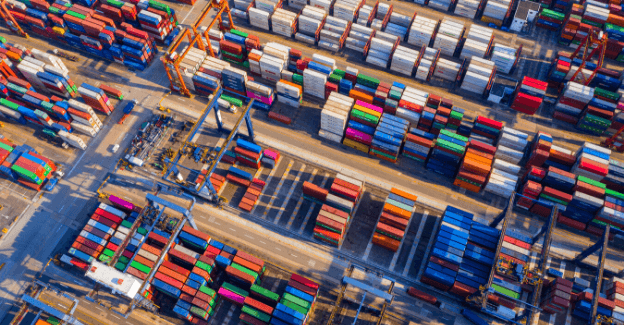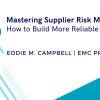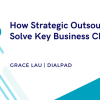This year has proven complex for organizations and their supply chains as they adapt to an ever-changing landscape filled with new risks and volatilities.
Forward-thinking leaders are turning to sustainability as the solution for building long-term resiliency and ROI. The recently released EcoVadis Business Sustainability Risk & Performance Index shows there is additional work to be done in the journey toward more sustainable business.
Shining the Spotlight on Sustainable Procurement
The index provides the most comprehensive view on the sustainability performance of supply chains around the world. It analyzes data from 65,000 assessments of more than 40,000 companies across nine industry sectors, five geographic regions and four assessment themes: environment, labor and human rights, ethics and sustainable procurement (which goes beyond a company’s own performance to measure how well they are addressing key sustainability issues within their supply chain).
Over the last five years, all theme scores have increased by at least 9%, except for sustainable procurement. In fact, sustainable procurement falls at the opposite end of the spectrum, increasing only 1% since 2015 and decreasing slightly since last year’s report.
This should serve as a wake-up call for procurement leaders. While improvements in other themes show that many companies are addressing important issues facing their own operations, such as working conditions, carbon/GHG emissions, and diversity and inclusion, there remains a huge piece of the puzzle that must be addressed — impacts in their supply base.
Investing in sustainable procurement, as opposed to focusing resources solely on internal improvements, can have a 10-100x greater impact on overall performance. This investment enables organizations to mobilize and elevate the performance of many other firms, including those throughout the tiers of the supply chain which are responsible for more than 80% of carbon emissions (Scope 3) in most industries.
Learning From Those Leading the Way
Out of the nine industry sectors examined in the index, the manufacturing sector leads the way in sustainability. All subsets, light, heavy and advanced manufacturing, are performing above world benchmarks.
These companies face intense public scrutiny when it comes to environmental and social issues, forcing them to prioritize energy consumption, greenhouse gas emissions and product efficiency. In particular, large light manufacturing companies’ scores outperform all other industries for that size group.
For small and medium-sized companies, the food and beverage sector outperforms its global counterparts with the exception of heavy manufacturing (which it falls less than a percentage point behind). The food and beverage industry has shown long-term commitment to sustainability through innovations for water usage, packaging and more.
These highly regulated sectors tend to perform better than others, likely due to their direct impact on health and safety, but various risks are associated with every industry. From pollution to government fines and regulations to forced labor, the issues facing all global companies can be addressed through strong sustainability management systems. As manufacturing and food and beverage have shown, if you prioritize sustainability, the rest will follow.
Health Crisis Vulnerabilities Are Critical
Due to the extensive supply chain impact of COVID-19, this year’s index also examined the health crisis risk and preparedness levels of companies around the globe. Results revealed that across industries, more than a quarter of suppliers have no measures in place to protect employee health and safety, ensure proper working conditions and monitor supply chain due diligence.
This means areas like in-regulation work hours, financial and non-financial benefits, supplier assessments and supplier risk analyses are being neglected worldwide.
In fact, 80% of suppliers lack supply chain due diligence measures, 57% aren’t monitoring working conditions and 44% don’t have employee health and safety preparedness. A major shift is needed. Addressing these issues not only helps establish business continuity, but also improves sustainability management systems — a key factor in bottom-line business performance.
Your New Normal
The ongoing crisis has only intensified the need for renewed focus on key sustainability issues. For many, this means reviewing business practices and identifying concrete ways to better support diversity and inclusion, while for others it means revamping climate change strategies to tackle carbon/GHG emissions.
When undertaking these initiatives, it’s vital to ensure leveraged tactics address the aspects that yield the largest return. What if you could impact diversity and inclusion issues across 100% of your supply base instead of focusing efforts solely on diverse-owned suppliers (which is typically limited to 5-10% of your supply base)? What if you could drive long-term results in the battle against climate change by focusing on value chain (Scope 3) emissions instead of just direct (Scope 1) and indirect (Scope 2) ones? With the right approach, you can.
Reigniting business smarter and better than before requires committing to sustainability best practices from the top-down. The results are clear — 75% of companies that have had their sustainability performance assessed at least twice improve or maintain their score.









